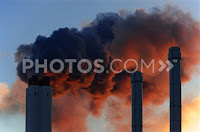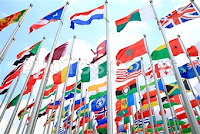Perception and Perspective
Interestingly the blog on Climate Change is way ahead in terms of readers’ choice. I’m surprised. My perception is that while many people do a bit of recycling, there is generally little engagement with a threat that looms large in my lifetime, and certainly my children's lifetime. Perhaps I'm wrong; or perhaps we just feel powerless in the face of something apparently beyond our control.
A viewer who appears to be an engaged environmental activist, took great exception (on fb timeline) to my view that the ‘ravages of climate change does not discriminate in terms of race and social class…’ He believes the key reason why little progress is made in tackling climate change is that the richer you are the less you suffer. After Hurricane Sandy he said, it was the lower middle classes who lived closest to the water line who had their homes destroyed by fire and flood. He went on to say that the Dutch can pay for and know how to build dykes and barriers, but good luck if you are Bangladeshi.
He has a point of course, but there is such a huge gulf in perception and perspective depending on who you are, where you live and what your experience has been up to now. For example, in my perception, extreme weather systems in the
My own personal view is that climate change is inevitable, as part of evolution. Neither scientists nor anybody else can stop the planet warming.
But excessive emission of CO2 is our main contribution to global warming. However long it takes, all of us will be impacted whether it is now, in 10, 20 or even 50 years time. But governments can and should begin now to invest in a portfolio of low carbon technologies, improve the infrastructure of towns and cities for maximum protection. New homes should be designed to withstand the worst impact of climate change.
If anyone in theUK
But excessive emission of CO2 is our main contribution to global warming. However long it takes, all of us will be impacted whether it is now, in 10, 20 or even 50 years time. But governments can and should begin now to invest in a portfolio of low carbon technologies, improve the infrastructure of towns and cities for maximum protection. New homes should be designed to withstand the worst impact of climate change.
If anyone in the
[I just know that the Jamaican posse up there in North London, Wolverhampton and Grantham will tell me that my translation sucks, but hey what can I say, I'm not Jamaican!]
The viewer referred to above said he works with farmers in West Africa and the only thing they have left to lose is their lives. :)
Up to now its is the pundits that talk to each other at climate change conferences, and we read of their views and conclusions on the issue in the papers. But that is so remote, and often yawn-making. What about having a global conversation among the ordinary everyday citizen, on the internet, across continents from Africa, the Caribbean, North and South America, Europe, throughout Asia and Australasia; just so that those living on the edge of climate change can share their experiences with those of us who do not yet know what it means to lose everything.
The other day some boy wonder and his dad (a small British company) managed to produce petrol from air, as a demonstration project. Perhaps someone will find a way to stop the planet from warming. Anything is possible. People tend to dismiss global warming because of the extreme cold that Europe andNorth America have experienced in recent times. But that’s not the point. It’s about the climate changing and the need to adapt or die, literally.
Up to now its is the pundits that talk to each other at climate change conferences, and we read of their views and conclusions on the issue in the papers. But that is so remote, and often yawn-making. What about having a global conversation among the ordinary everyday citizen, on the internet, across continents from Africa, the Caribbean, North and South America, Europe, throughout Asia and Australasia; just so that those living on the edge of climate change can share their experiences with those of us who do not yet know what it means to lose everything.
The other day some boy wonder and his dad (a small British company) managed to produce petrol from air, as a demonstration project. Perhaps someone will find a way to stop the planet from warming. Anything is possible. People tend to dismiss global warming because of the extreme cold that Europe and




Comments
Post a Comment